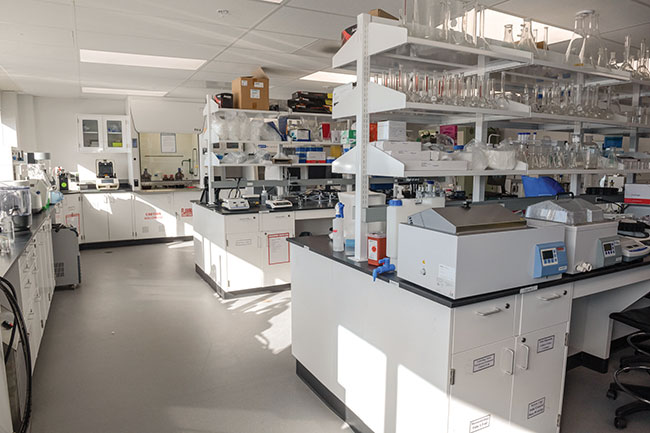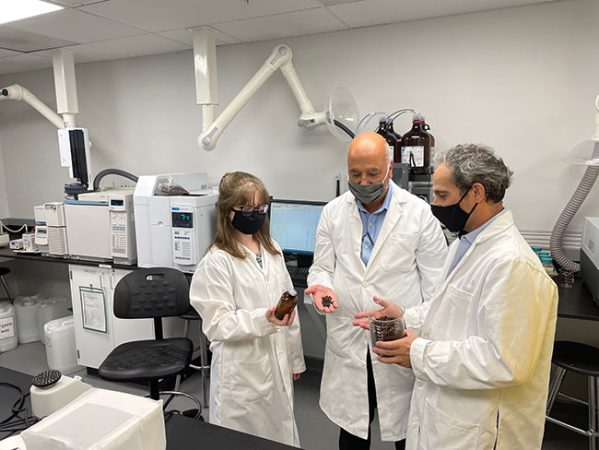
News
Business
Extraction
Production
Research
Collaborating with scientific innovators in the Canadian cannabis space
By working with applied researchers at Canadian colleges, LPs can gain the competitive edge when developing new cannabis-based food and beverage products.
May 20, 2022 By Andrew Kaszowski
 Fanshawe College's Centre for Applied Research and Innovation in Biotechnology focuses on ultra-high purification of trace cannabinoids.. Photos courtesy Fanshawe College
Fanshawe College's Centre for Applied Research and Innovation in Biotechnology focuses on ultra-high purification of trace cannabinoids.. Photos courtesy Fanshawe College The growth of the cannabis 2.0 food and beverage market in Canada is marked with tremendous innovation to meet customer demand for new products.
Meeting the ongoing need to develop novel formulations through extraction requires research and development (R&D) support, which is often a costly undertaking for many small- to medium-sized licensed producers. Fortunately, there are several Canadian colleges with applied cannabis research licenses that offer a competitive advantage as they possess R&D expertise and funding capabilities that can help remove the barriers to growth.
Based in London, Ont., Fanshawe College’s Centre for Research and Innovation (CRI) aims to accelerate new product development, encourage knowledge sharing and technology transfer in the food processing sector and promote the development of a network within the industry. The centre specializes in the development and enhancement of new and existing products through an in-house food innovation laboratory backed by a team of expert researchers. Further, CRI offers access to funding for eligible projects of up to $100,000 per year.
“Conducting innovation projects for R&D is a very expensive undertaking for many growing companies,” says Colin Yates, PhD, chair of research at research at CRI. “Most colleges are able to offer generous government funding that we already have available to eligible projects, which can de-risk the process of product development by partnering together to validate and develop exciting innovations. A college’s measure of success is helping the Canadian economy prosper, and we do that through innovative R&D.”
Each institution in Canada with a cannabis research licence tends to focus on specific areas of R&D. For example, Fanshawe’s CRI has carved a niche in applied R&D for the processing industry by focusing on ultra-high purification and formulation of trace cannabinoids with potencies exceeding 99 per cent. CRI specializes in advanced chromatography and high shear micronization technologies for products in food, beverage, nutraceutical and pharmaceutical. The centre’s capabilities are mainly focused on processing: extraction, purification, analysis and processing, such as homogenization, spray-drying and encapsulation, are a few of the core competencies available.
“More industry awareness is needed about the intellectual resources available to conceptualize, execute, conclude and deliver on projects by Canada’s applied research institutions at colleges,” says CRI’s lead cannabis researcher and faculty member Sahar Samimi, PhD. “With expertise among college faculty, external researchers with real hands-on industrial and global experience working in industry and an intellectual property-friendly approach to working with businesses, CRI has a winning combination to bring the ideas to fruition.”

CRI research team working on cannabis research projects (from left to right): Olivia Peicheff, Omar Zoaarob, and Istok Nahtiga.
The strength of college-assisted R&D is evident when looking at two recent industry projects that partnered with CRI. The first product was for Toronto-based Johnny Gold, which developed a novel CBD-coated coffee bean.
“I love good coffee and I was curious about combining CBD with coffee beans,” says John Filice, Johnny Gold’s founder. “When I learned that Fanshawe had a cannabis research licence I thought of reaching out to explore product development, and I’m happy to say we have produced something special. My hope is to commercialize it soon.”
Filice says that working with a college helped bridge the gap in scientific knowledge needed to make something truly innovative. “There’s an extraordinarily important scientific piece that went into my coffee-based product from the outset. I needed to find scientists who could help me develop this into something real, and the team at CRI worked with me hand-in-hand all along the way with my vision. The experience of working with a research team at a college made this all possible.”
The second project that the CRI team collaborated on was met with similar success. Nan Li is Founder of Lupos (Canada) Biotechnology Inc., Canada’s largest white-label standard processor of cannabis topicals. Lupos worked with CRI on advanced purification research during the past year.
“Working with a college research team was very beneficial from a time and cost perspective,” Li says. “CRI has incredible capabilities in the labs and with the scientists’ knowledge to develop our technologies further. Colleges build strong relationships with industry partners through the scientists and project managers who keep things on track.
“As a business, while we have these capabilities in-house,” Li adds, “we also collaborate with partners to accelerate technology advancement in a competitive environment – so having these resources available to us through the college was a huge help. Accessing the support helped us fast-track things, and the project managers really kept the project on track.”
Andrew Kaszowski is the industry outreach & communication coordinator at Fanshawe College Centre for Research & Innovation, where he supports outreach activities in the agri-food, cannabis processing and sustainable building automation industries.
Print this page